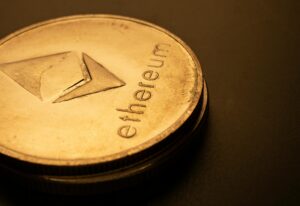Mariana dam collapse victims speak out as London trial begins

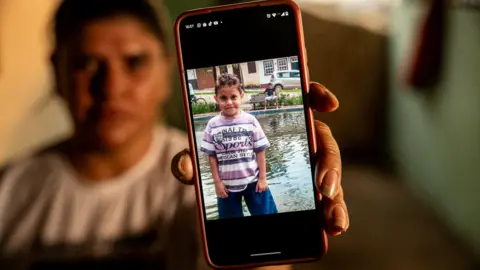 BBC
BBC“The last words I heard him say were, ‘Did you know that you are the best mum in the world?’”
Gelvana Rodrigues’s son, Thiago, was seven years old when toxic mud flooded into their home and killed him.
He was one of 19 people that died after the Mariana dam collapse in Minas Gerais, Brazil on 5 November 2015.
It is remembered as the worst ever environmental disaster in Brazil.
The dam was owned by Samarco, a joint venture between the mining giants Vale and BHP.
It was used to store waste from iron ore mining. When it burst, it unleashed tens of millions of cubic metres of toxic waste and mud.
The sludge swept through communities, destroying hundreds of people’s homes and poisoning the river.
Gelvana was at work when the disaster happened, while her son was staying at home with his grandmother.
After she heard the news, she ran back to find “everything destroyed”.
“I spent three days not eating or sleeping, I just wanted to find my son,” she said.
After seven days, she heard that rescuers had found Thiago’s body.
“That day my life ended, because I lived for him.”
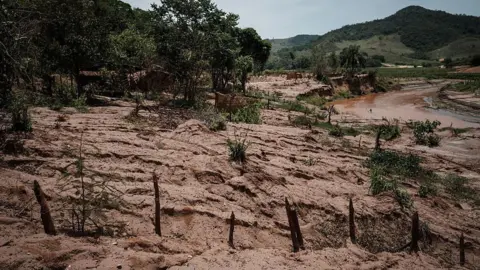 Getty Images
Getty ImagesGelvana is one of the 620,000 people who are taking BHP to court in the UK over the disaster.
A civil trial beginning in London on 21 October will determine whether the Anglo-Australian company was responsible.
The claimants’ lawyers argued successfully that the trial should be held in London because BHP headquarters “were in the UK at the time of the dam collapse”.
If BHP loses this case, a second stage will take place to determine who is entitled to further damages payments, and how much.
A separate trial against Samarco’s second parent company, Brazilian mining company Vale, is taking place in the Netherlands, with about 70,000 plaintiffs.
Both companies have agreed that if either is found liable for damages, they will split the costs.
Marcos Muniz, known as Marquinhos, moved to one of the towns that was hit – Bento Rodrigues – in 1969, when he was six years old, to the same house where his father was born. Later, as an adult, he built his own house on some more land his father had bought there.
Marquinhos worked for Samarco for almost 30 years before he retired. He had livestock, pigs, and orange trees that he looked forward to tending to in retirement.
“I never imagined this could happen,” he said. “If I had known that in the future this would happen, that the place and the community where I was raised would be destroyed, I would definitely have stopped working there.”
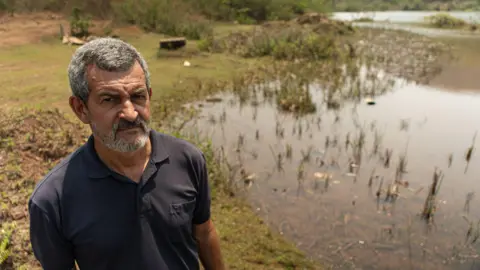
Bento Rodrigues now resembles a ghost town. The houses lie in ruins and are still covered in thick mud. Marquinhos’s house was washed into the nearby lake, and only the very tip of it is now visible.
BHP and Vale have set up an organisation called the Renova Foundation tasked with compensating victims.
It has offered them either cash compensation, or a house in a new city that the foundation has built to replace this town called Novo Bento.
The Renova Foundation says it has disbursed more than $7.7bn (£5.9bn) in repair and compensation actions to date, to more than 445,000 people, with about 50% of that being paid directly to affected people.
But the companies say this does not mean they accept liability for the disaster.
The community were given a say in where the city was built, and the design of their new homes.
Marquinhos has been offered a house there but fears, in this modern city, his way of life and community will be lost.
The new city is still being constructed. It is up on the hills, as opposed to down by a lake, and it has a more modern, urban feel to it.
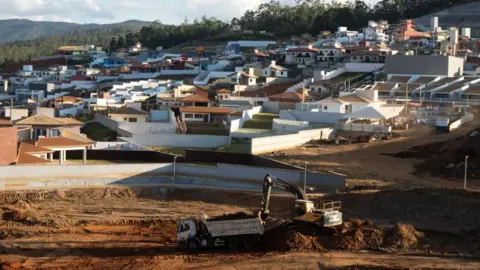 Getty Images
Getty ImagesDarliza das Graças moved there a year ago. She owned a small bar in the “old” Bento Rodrigues and runs a restaurant now.
“Life here is wonderful, it’s good. But at the beginning it was very difficult, there were few residents,” she said.
“Now they are coming, it’s much better.”
More than 100 people have been resettled there so far, but – nine years on – there are still some who have not yet moved in because their house is not ready, or because they have chosen not to.
While Darliza is happy here, she says she preferred her old life because “the community there was more united”. Not everyone from her old community has chosen to live here.
BHP and Vale deny claims of liability in their entirety and argue the UK legal action is “unnecessary as it duplicates matters already covered by the existing and ongoing work of the Renova Foundation and other legal proceedings in Brazil”.
All companies involved say they remain “committed” to repairing the damage caused. BHP and Vale have made a fresh offer to the Brazilian government, expected to be signed on Friday, to pay out more than 170bn reais ($45bn) in compensation.
Samarco added the Renova Foundation has compensated 18 of the 19 families of victims who died and continue to contact families and lawyers in cases that have not been resolved.
Fernanda Lavarello, head of corporate affairs at BHP Brasil, said: “What happened in 2015 was a tragedy. We are sorry about what happened. Since then, BHP never abandoned the country and is doing everything it can to repair the environment and life of those families.”
“Some processes are taking longer than expected, because it is quite complex, but for the families that chose quickly to have their houses built here, their houses are ready, and they have already moved in.”
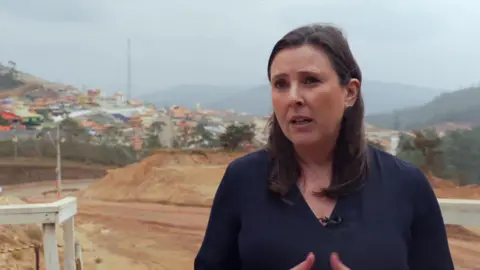
The UK legal case against BHP began in 2018 when residents and some local companies and authorities decided to seek what their lawyers describe as “fair and full compensation” for the damage suffered.
The claimants’ lawyers – Pogust Goodhead – argue BHP is liable because Samarco was a “legal entity for their production of Iron Ore and BHP were operationally in control of the company and their decisions. This means that BHP knew or ought to have known when key decisions were made which resulted in the collapse of the dam.”
If they win, they expect that the compensation could reach $44bn (£34bn) in what has been described as one of the largest collective environmental lawsuits in the world.
For some, like Marquinhos, this is about trying to receive more compensation than previously offered, so that he can afford to rebuild his life in a place of his choosing.
For some, no amount of money can compensate for what they lost.
“Nothing can bring a life back,” Gelvana says about her son Thiago. “There is no money in the world that can buy a life. I just want justice so that no mother will be sitting here in the same place as me.”
#Mariana #dam #collapse #victims #speak #London #trial #begins
News plays a pivotal role in our lives by keeping us informed and connected to the world. It serves as a critical source of information, offering updates on current events, politics, economics, science, and more. Through news, we gain awareness of global issues and local developments, helping us make informed decisions in our personal and professional lives. News also fosters discussion and debate, encouraging critical thinking and perspective-taking. Moreover, it promotes transparency and accountability among governments, businesses, and other institutions. In a rapidly changing world, staying updated with the news enables us to adapt to new challenges and opportunities, shaping our understanding of the complexities of society. Ultimately, news is not just about information; it empowers us to participate actively in the world around us, contributing to a more informed, engaged, and responsible global citizenry.
Health is fundamental to our well-being and quality of life, making it an essential aspect of daily existence. It encompasses physical, mental, and emotional aspects, influencing our ability to function effectively and enjoy life fully. Prioritizing health allows individuals to maintain optimal physical fitness, reducing the risk of diseases and promoting longevity. Mental health, equally crucial, affects our cognitive abilities, emotional stability, and overall happiness. Investing in preventive healthcare through exercise, balanced nutrition, and regular medical check-ups helps in early detection of potential health issues, ensuring timely intervention and treatment. Beyond individual benefits, a population’s health impacts societal productivity and economic stability. Governments and organizations worldwide emphasize public health initiatives to address pandemics, health disparities, and promote overall well-being. Ultimately, health serves as the foundation upon which we build our lives, influencing our ability to pursue goals, nurture relationships, and contribute meaningfully to society.
Money plays a crucial role in our lives as a means of financial security and freedom. It enables us to meet basic needs such as food, shelter, and healthcare, while also providing opportunities for education, travel, and personal growth. Beyond material comforts, money facilitates social connections and experiences that enrich our lives. It empowers individuals to invest in their futures, whether through savings, investments, or entrepreneurial ventures, thereby fostering economic stability and growth. However, the pursuit of wealth should also be balanced with ethical considerations, as money can influence relationships and societal dynamics. Responsible management of finances is key to achieving long-term goals and mitigating financial stress. Ultimately, while money is a tool for achieving aspirations and fulfilling desires, its true value lies in how it is utilized to improve both personal well-being and the broader community.
Earning Easy Money in 2024: Opportunities and Considerations 💸
In 2024, the landscape of earning easy money presents diverse opportunities, albeit with considerations. The digital age offers platforms for freelancing, online trading, and e-commerce, allowing individuals to leverage skills and creativity for financial gain. Cryptocurrency investments continue to allure with potential for quick profits, yet they entail high volatility and risk. Moreover, the rise of the gig economy enables flexible work arrangements through apps and websites, offering quick payouts but often without job security or benefits. Passive income streams such as rental properties and investments in stocks or bonds remain viable, but demand initial capital and ongoing management. Amid these options, caution is essential to avoid scams and unsustainable ventures promising overnight success. Ultimately, while the allure of easy money persists, informed decisions, diligence, and a long-term perspective are crucial for sustainable financial growth and security in the dynamic year ahead.





